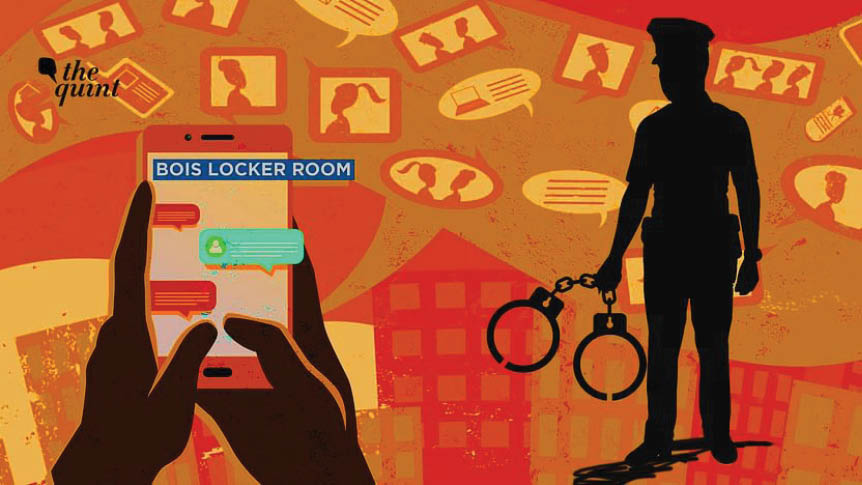Aviva Damania is a Psychologist – Mental Health Specialist, trained at City University of London (MSc Mental Health). She began counseling in 2014 as a Volunteer Counsellor at Charities in Mumbai, and has practiced at Masina Hospital. Having worked with adults, adolescents and children, Aviva’s primary areas of expertise include dealing with Depression, Anxiety, Anger, Stress amongst other issues. She currently shares her expertise at Pittie Group as Sr. Manager – Workplace and Employee Wellness. Parsi Times is delighted to welcome on board, the young, dynamic and proficient Aviva Damania, who will share significant symptoms, solutions and insights into numerous concerns which affect our mental wellbeing. Aviva is available for professional counseling on chat, phone and video call. You can connect with her at: avivadamania18@gmail.com
The infamous episode of ‘Bois Locker Room’, where a group of teens created an Instagram group to share explicit photos, graphic sexual comments and objectifying language, has brought about an opportunity to discuss psychological perspectives on a range of issues such as cyber-bullying, sexualised behaviour, gender violence and the like. An incident like this is undeniably a nightmare for parents of adolescents. This episode may have come as a shock to some, but the pervasive truth is that this is one of numerous groups floating around the internet. Cyber bullying can impact mental health, giving rise to depression, anxiety, worry, stress, risk of self-harm or in extreme cases suicidal ideations.
Underlying Causes: One of many rationales for such happenings is biological determinism, certainly not an excuse, but worthy of mention that adolescent years are a cocktail of hormones and a developing brain. But action and behaviour are the result of a combination of biology and the environment (all that the child is exposed to). Capable of learning and unlearning things, teenagers may inappropriately absorb content they are exposed to, considering the amount of time they spend on the internet.
Adolescents may be aware what they’re doing may not necessarily be right, but they are unaware of the intensity of how wrong it is. Some may even be victims of peer pressure, ignorantly hopping onto this bandwagon. As regards swearing, name-calling, sexual violence and so on, Gen Z’s usually converse rather casually, causing political and social correctness to be ignored.
Sexualised actions, language and violence can be a learned behaviour as a result of observational learning, what they see at home such as how parents address each other or how they are addressed by parents for example, physical or emotional abuse. Overly sexualised behaviour, is also closely linked to internalised sexual abuse. As a mental health specialist I think it is of consequence to explore the underlying causes of such behaviour along with intervention plan to prevent this occurrence.
What Needs To Be Done…
At Home:
Parents need to be careful about how they address each other in the presence of their child. Remember that most behaviour is also a response to stimulus, so reflect if you may be the stimulus that’s eliciting a response from the child. Understand that it’s futile to worry about things that are out of one’s control. The kind of movies and series that kids are exposed to may not be appropriate as there is glorification of sex and violence. You can’t control the media, and kids’ exposure to it.
However, what can be done is to control how they perceive what they watch. The content they watch may stir up curiosity about sexuality, which is normal during teenage years. It is important to address their questions. And you, as a parent or a guardian, must be the one to do so. If they are not spoken to, they will attempt to get clarity on their own which can lead to further exposure and confusion. Create a comfortable environment for open discussion so they don’t have to look for answers outside. One may think that the way to counter this is to control your child’s internet and phone usage, but this may not be the best way forward. The idea is not to take reality away from the adolescent, but rather effectively prepare them for reality.
In Schools:
Adolescents spend more time in school than at home. At school, they’re exposed to an array of different opinions and ideas, which may be contrary to real facts. Building awareness by conducting regular workshops can help along with inculcating the following:
 Sex Education: Society tends to shy away from topics like sex and gender roles. However, not discussing this doesn’t mean it ceases to exist. This conservative system facilitates ignorance and misinformation. Comprehensive sex education must form a part of school curriculum.
Sex Education: Society tends to shy away from topics like sex and gender roles. However, not discussing this doesn’t mean it ceases to exist. This conservative system facilitates ignorance and misinformation. Comprehensive sex education must form a part of school curriculum.
Value Education: in areas of consent, morals, ethics, gender studies and most importantly empathy. Only when adolescents learn to put themselves in the shoes of others, will they derive less pleasure from projecting any sort of violence onto others. Empathy builds sensitivity.
Educating Parents: In many cases, parents may not know how, when or if they should have “the talk” with their child. It is imperative that Schools hold workshops for parents at an early stage to guide them. They must be taught pertinent ways to communicate with children through the different stages of their development.
Counsellor Visits: All schools have counsellors, but it is not likely that a student will voluntarily seek counselling. A few sessions with counsellors must be made compulsory, this will also help destigmatize reaching out for mental health services. Counsellors need to be with the times and need to address ongoing issues by having interactive workshops and seminars. Schools need to support counsellors in their endeavour to help students.
Legal Knowledge: Merely stating what is wrong may not always be enough to control undesirable behaviour. Imbibing knowledge about what is enforceable by law can have a much stronger impact as a result of being aware of direct consequences.
Careful With Your Content: Assuming that women are more likely to be objectified, young girls must be wary about the kind of content they share personally and publicly, whereas young boys must be careful about what they comment and share. In the current internet culture, where screenshots are the new evidence, your footprints cannot be erased. Once something is on the internet, it cannot be removed. Adolescents must be made aware of the consequences that may follow explicit content, comments etc. Besides misuse, such content can impact their future in terms of admission to universities and even employment.
It’s time we acknowledge these problems at the grass-root level and treat the cause rather than symptoms!
- Let’s Pledge To Positivity This Navroz! - 15 August2020
- Employee Mental Health during coronavirus (COVID-19) - 1 August2020
- Psychological Perspective: The ‘Bois Locker Room’ - 16 May2020
